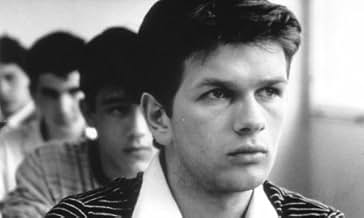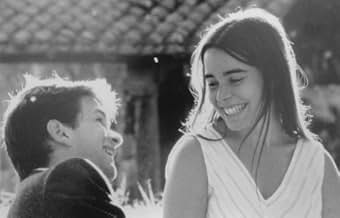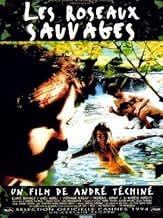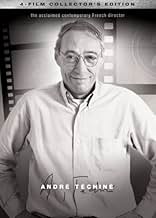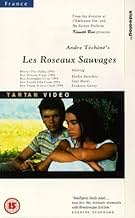Les roseaux sauvages
- 1994
- Tous publics
- 1h 50min
Ajouter une intrigue dans votre langueThe fates of two partners are divided.The fates of two partners are divided.The fates of two partners are divided.
- Réalisation
- Scénario
- Casting principal
- Récompenses
- 8 victoires et 7 nominations au total
Avis à la une
Three boys on the verge of manhood (with the French-Algerian conflict smoldering in the background) are in residence at a boarding school in the south of France in 1962. One is gay, the second is bi-sexual and the third is straight. Through their interactions we (and they) discover their sexuality.
Francois Forestier, played attractively by Gael Morel, is gay as he discovers one night when Serge Bartolo (Stephane Rideau), an athletic schoolmate with a natural style, awakens his sexuality by seducing him. For Serge it is just a school age sexual adventure; for Francois it is love so intense he is transformed. The third boy, Henri Mariana, who is from Algeria, is a little older and a little more cynical. He finds heterosexual love with his enemy, Maité Alverez, who is a hated communist. Elodie Bouchez, whom I recall from The Dreamlife of Angels (1998) for which she shared a Cannes Best Actress award, plays Maité whose style is earnest, witty and brave.
As it happens I was in France during the period of this film, and a teenager as well. The Algerian conflict haunted the young men because as soon as they were of age they could be sent away to fight. Also the Communist Party was strong in France and an attraction to some who opposed what they saw as French colonialism in Algeria and Vietnam. Director André Téchiné who characteristically explores human sexuality in his films (e.g., Rendez-Vous (1985) with a young and vital Juliette Binoche; Le lieu du crime (1986) with Catherine Deneuve; and Ma Saison Préférée (1993) also starring Catherine Deneuve) attempts to integrate these larger issues into his film but I don't think is entirely successful. Serge's older brother is killed in Algeria and his teacher blames herself for not helping him to escape his military service and suffers a nervous breakdown. However this story is not well-connected with the rest of the film. Also more could have been done with the divergent views of Maité and Henri. What I loved was the club scene where suddenly the French girls are twisting to Chubby Checker's "Let's Twist Again" which propelled me back to 1962 when indeed the Twist was all the rage in France.
What makes this film superior is the warm and truthful way in which the sexual awakenings are realized. The kids seem absolutely real and the dialogue is sharp and authentic. Morel is very winning. I especially liked the earnest way he confronts and then accepts his sexuality. Interesting was the scene in which he seeks out the shoe salesman whom he knows is gay for his advice on how he should cope with unrequited homosexual love.
This is a film about young people for open-minded adults attractively done. For many it will strike a strong cord of recognition.
(Note: Over 500 of my movie reviews are now available in my book "Cut to the Chaise Lounge or I Can't Believe I Swallowed the Remote!" Get it at Amazon!)
The movie is set in 1962, just at the end of the Algerian War of Independence. To fully understand and enjoy the movie, it's helpful to know the basics. French soldiers were still being sent to Algeria to oppose independence. The OAS was a right-wing group in Algeria and France that wanted to retain French colonial power.
We don't see Algeria in the movie--the action takes place in and around Toulouse, in southern France. The film is a coming-of-age movie for four young adults.
Élodie Bouchez portrays Maïté Alvarez, the only woman of the four. Gaël Morel is François Forestier, Stéphane Rideau plays Serge Bartolo, and Frédéric Gorny portrays Henri Mariani.
The three young men are studying in a boarding school. Maïté's mother teaches at the school. She and her daughter are both Communists, and they believe in Algerian independence.
The movie examines a few weeks in their lives. These weeks are filled with self-discovery and interaction among the four adolescents. Some of the events are profound and will change what happens to them in the future.
We saw the film on DVD. It would work better on the large screen, but it was OK on the small screen. The movie has a solid IMDb rating of 7.4. I thought it was better than that and rated it 8.
Techine's direction gives the many strands of this story a great, personal feel - the shoe store scene stands out as an honest depiction of an individual recognizing and trying to accept his sexuality, and attempting to identify other gay people, as a way of lessening isolation, and in an attempt at spontaneously finding some sort of role model. Very thoughtful and very well-made.
Le saviez-vous
- AnecdotesThere are many references in the movie to "The O.A.S.," in conversation, and overheard on radio and television newscasts. OAS - or Organisation armée secrète, literally "Organization of the Secret Army" or "Secret Armed Organization," was a French nationalist terrorist organization during the Algerian War (1954-62), which ended in independence for Algeria in July 1962, which was not only the time setting for this movie, but the Algerian War was also the background conflict that propelled much of the plot of this film. Using armed struggle in an attempt to prevent Algeria's independence, OAS's motto was "Algeria is French and will remain so" (L'Algérie est française et le restera).
- GaffesOne of the songs featured at the party which Maïté and François go to after the movie is "Barbara Ann" by The Beach Boys, which was recorded and released in the fall of 1965, a full three years after the 1962 time setting for this movie.
- Citations
François Forestier: I'm like you, I'm queer, but I haven't met my soul-mate yet. I met someone who doesn't want me. I should give up. That would be smarter. But I'm not smart. I have no chance, but I can't give up. I don't get discouraged. We made love once. Just once. In the beginning. He doesn't want to anymore. Since then I'm like a thief. I steal brief moments... Once I held him tight on my bike. Another time, I slept near him. You have experience. Only you can help me. At my age, did this happen to you? When you liked a boy, what did you do? How did it work?
Monsieur Cassagne: Listen... It was so long ago... I don't want to disappoint you, but I've forgotten. I'm sorry. I have a client waiting. I have to go.
- Versions alternativesShorter TV version released under the title Tous les garçons et les filles de leur âge: Le chêne et le roseau (1994) (TV)
- ConnexionsFeatured in Cinéma, de notre temps: André Téchiné, après la Nouvelle Vague... (1993)
- Bandes originalesAdagio for Strings
by Samuel Barber
Meilleurs choix
- How long is Wild Reeds?Alimenté par Alexa
Détails
Box-office
- Montant brut aux États-Unis et au Canada
- 807 775 $US
- Montant brut mondial
- 807 775 $US
- Durée1 heure 50 minutes
- Couleur
- Mixage
- Rapport de forme
- 1.66 : 1
Contribuer à cette page



